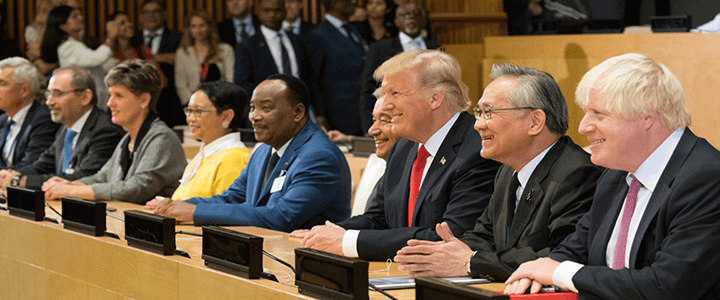The Joint Comprehensive Plan of Action — the Iran nuclear deal — isn’t officially dead. But with the U.S. now on the way out, it might as well be. President Trump announced he is “terminating United States participation in the JCPOA, as it failed to protect America’s national security interests.” This clears the way for the reimposition of sanctions lifted after the deal was signed in 2015.
The Treasury Department will begin the process of restarting the sanctions immediately. They resume after a six-month period to allow companies “to wind down operations in or business involving Iran.”
What does this mean in the short term?
American withdrawal from the deal doesn’t necessarily mean the whole thing is done. Iran could decide to continue to comply with the terms in exchange for the other parties — Britain, France, Germany, China, and Russia — not also reimposing sanctions.
In the medium term, it looks as though Trump might just get what he wanted. After his announcement, French President Emmanuel Macron, a supporter of the deal, tweeted “We will work collectively on a broader framework, covering nuclear activity, the post-2025 period, ballistic activity, and stability in the Middle-East, notably Syria, Yemen, and Iraq.”
Trump called the JCPOA “one of the worst and most one-sided transactions the United States has ever entered into.” The deal was intended to “ensure the exclusively peaceful nature of Iran’s nuclear programme,” and “that under no circumstances will Iran ever seek, develop or acquire any nuclear weapons.” Instead, it gave literal piles of cash to the Iranian mullahs, which they used to continue their campaign to destabilize the Middle East through proxies such as the Syrian regime of Bashar al-Assad, the Hezbollah terrorist group in Lebanon, and the Houthi rebels in Yemen.
The deal required Iran, among other details, to: refrain from producing weapons-grade plutonium in its existing heavy water reactor and halt construction on an additional heavy water reactor; rely only on light water reactors for future nuclear power generation; refrain from reprocessing spent reactor fuel (which yields plutonium that can be used to build a nuclear weapon), but only for 15 years; limit its uranium enrichment activities; and limit its stockpile of low-enriched uranium.
But in reality, the deal merely delayed Iran’s attainment of a nuclear weapon; it did not prevent it. Uranium enrichment was limited, not prohibited. And the deal contains no mechanisms for preventing the resumption of what we now know for certain was a nuclear weapons program after 15 years have passed. When it’s done, it’s done.
the future of diplomacy
Several commenters, including NBC’s Andrea Mitchell, wondered aloud how any other country could be expected to take the U.S. at its word on international agreements ever again. The answer is far more simple than she might like to admit. The JCPOA is many things, but it is most decidedly not a treaty to which the U.S. is bound.
Presidents come and go. But Senators serve for six-year terms, and may be reelected innumerable times, for a very good reason. The Senate acts as a check on presidential executive power. Formal treaties require the advice and consent of the Senate to become binding upon the country. Once the Senate consents and the president ratifies a treaty, its provisions become part of U.S. law.
Presidents have implemented executive agreements like the JCPOA in the past. But in each case, the other signatories assumed the risk that a future president with different priorities would do exactly what Trump has done here. Obama knew that the deal would never have received the necessary two-thirds majority in the Senate. That’s a high hurdle for any president to clear, let alone one as politically divisive as Barack Obama. And the system was designed that way for a reason.
It is the embodiment of President George Washington’s admonition in his 1796 Farewell Address that it is “our true policy to steer clear of permanent alliances with any portion of the foreign world.” The Founders made lawmaking difficult. Treaties become law; their passage is similarly difficult, because adhering to them is vitally important for international understanding.
Charles Cotesworth Pinckney, a South Carolina delegate to the Constitutional Convention and early American diplomat, was instrumental in ensuring the Senate’s role in approving treaties became part of the Constitution. In debates over the Constitution in his home state, Pinckney said of the government as formed under the Articles of Confederation, foreign nations declare they can have no confidence in our government because it has not power to enforce obedience to treaties.”
The country has withdrawn from more than 40 treaties in its history, most times by an act of Congress, yet other nations have still dealt with us in good faith. They will continue to do so after the JCPOA dust has settled. But if they’re smart, they’ll insist on the Senate’s involvement in any future deals.



